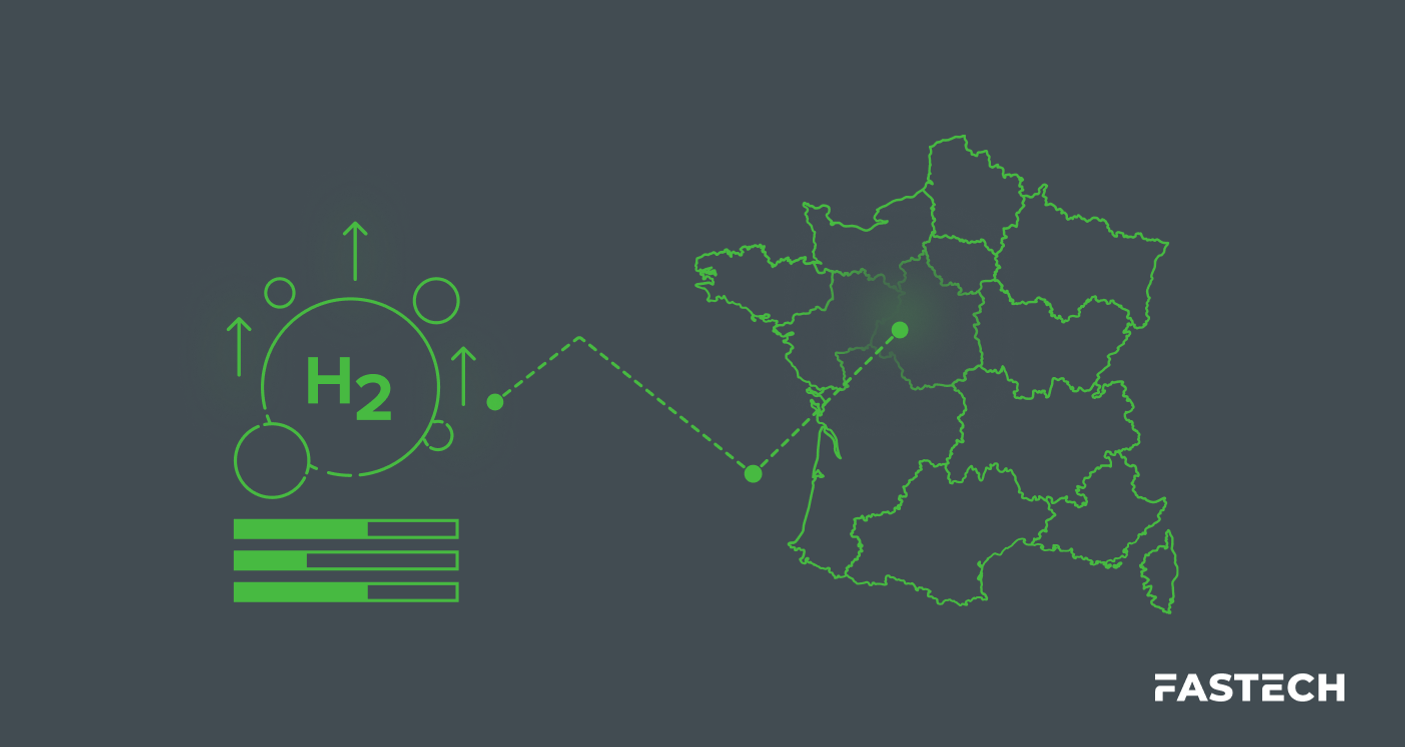The Advantages of Hydrogen Fuel (And Its Limitations)

Hydrogen fuel is a promising clean energy source that emits only heat and water upon use. As global demand for more sustainable fuel sources magnifies, the use of hydrogen fuel is increasingly garnering attention in the heavy-duty mobility sector.
Heavy-duty vehicles—such as trucks, planes, ships, and public transit—are notoriously hard to fuel with electricity alone. Hydrogen's versatility in serving diverse transportation industries is helping pave a pathway in which reaching net zero becomes a viable reality.
But what are the specific advantages and challenges of hydrogen fuel cells in heavy-duty mobility? Here’s the latest news and applications for this exciting technology.
Table of Contents:
- What is hydrogen fuel?
- Advantages of hydrogen fuel in heavy-duty mobility
- Challenges of hydrogen fuel in heavy-duty mobility
- Orange County Transportation Authority (OCTA) case study
What Is Hydrogen Fuel?
As the universe's lightest and most abundant element, hydrogen carries significant advantages as a long-term source of environmentally friendly energy. While it might seem like a recent development, there’s a long history of research on hydrogen as a fuel source. Today, it’s become all the more attractive as production methods using other clean energies reach the mainstream.
When used in fuel cells, hydrogen reacts with oxygen to create electricity. Heat and water vapor are the only emissions. As such, it’s considered to be among the cleanest fuel sources.
The primary advantage fuel cell electric vehicles (FCEVs) have over “traditional” battery electric vehicles (BEVs) is how they source the electricity powering the engine.
FCEVs store hydrogen (H2) as fuel to create electricity as it’s needed. Compared to electric batteries, hydrogen storage is far more efficient and results in less energy loss.
For reference, an Oxford study found that gaseous hydrogen’s lifecycle leakage rate—including production, transportation, storage, and end-use—is around 4.2% as of 2022 and is expected to lower to 3% by 2030.
By comparison, BEVs store electricity in batteries, which are prone to higher rates of self-discharge (lost energy). Even the BEV industry’s top-performing battery, lithium-ion, self-discharges 5% within the first 24 hours of storage and up to 5% more per month.
However, if the hydrogen is liquefied, this relationship reverses. The liquefication process alone loses 40% of the hydrogen’s energy, with an additional lifecycle leakage of 10-20% (as of 2022). As hydrogen liquefication and storage technology advances, Oxford predicts this leakage rate will fall to 4-5% by 2030.
Benefits of Hydrogen Fuel in Heavy-Duty Mobility
Naturally, an eco-friendly fuel is particularly promising for the heavy-transport sector, which accounts for approximately 27% of U.S. GHG emissions.
This industry’s biggest challenge in transitioning to clean fuel sources is its demanding nature. Electric batteries take hours to recharge and have significantly lower ranges than diesel.
Amazon’s new electric Class 8 semi trucks have a maximum range of 275 miles. A comparable diesel vehicle could be expected to reach 1,300-1,800 miles; and (though not a direct comparison) the Class 7 FCEV, H2Rescue, recently set a world record for traveling 1,800 miles on a single hydrogen fill.
Zero Emissions
The primary driver behind the adoption and acceleration of hydrogen fuel in heavy-duty mobility is its potential as an eco-friendly substitute for fossil fuels. Meeting ambitious net-zero targets remains a significant challenge, if not an impossibility, without a viable alternative to power the engines that drive modern commerce and civilization.
Current solar and wind technologies are not yet advanced enough to fully replace fossil fuels, particularly for heavy-duty applications. Besides their intermittent availability as resources, their power supply is bottlenecked by the above-mentioned limitations in electric battery storage (particularly self-discharge).
Hydrogen fuel presents promising solutions to this dilemma, as it can generate the power necessary to move multi-ton vehicles without emitting harmful greenhouse gasses (GHGs).
Hydrogen also benefits energy storage systems, acting itself like a battery for holding surplus energy output. These advantages can be leveraged by conventional and renewable power grids alike—especially with electrolysis systems that convert electricity into gaseous hydrogen.
Energy Efficiency
Hydrogen-powered vehicles utilize fuel cells to convert hydrogen gas into electricity, which then powers electric motors to propel the vehicle. This process offers several efficiency benefits over traditional internal combustion engines and even battery-powered electric vehicles:
- High Energy Density: Hydrogen fuel has a very high energy density, which means it can store a large amount of energy per unit of mass. However, hydrogen’s low volumetric energy density means it must be compressed to use as fuel.
- Reduced Weight: Hydrogen fuel cells are significantly lighter and smaller than batteries used in electric vehicles, contributing to overall weight reduction in heavy-duty applications. This feature still holds true in fuel cells that use electric batteries for surplus storage, as the size is marginal compared to an BEV system.
- Thermal Efficiency: Hydrogen fuel cells convert a higher percentage of the chemical energy in hydrogen into usable power compared to internal combustion engines. Notably, this is one area where BEVs are still higher-performing than FCEVs, but the gap is closing quickly.
Renewable Energy Source
Hydrogen can be produced domestically from various renewable sources, including biogas, solar, and wind power.
Its flexibility underscores its central role in enabling a sustainable energy transition and reducing dependency on conventional fossil fuels.
Quick Refueling
Refilling a hydrogen tank takes only a few minutes, similar to refueling a gasoline or diesel vehicle. This feature is critical for shipping, transport and logistics industries where time is at a premium. The hours-long recharging process for BEVs makes electric-only vehicles a non-starter for most fleet managers.
Lower Operational Costs
Hydrogen power may be the key to reducing a vehicle fleet’s operational costs. Compared to battery-powered or internal combustion engine counterparts, hydrogen-powered vehicles offer comparable if not superior performance and reliability in a number of ways:
- Fuel cells can reduce costs associated with changing, charging, and managing electric batteries
- Results in reduced labor, time, and space compared to BEVs.
- Units run longer than lead-acid batteries.
- Units refuel up much faster than a battery charge, reducing downtime.
- Hydrogen fuel cell technology is extraordinarily resilient against harsh conditions remains operational in sub-zero weather.
- Finally, hydrogen fuel is not subject to fluctuating oil prices, making an operation’s fuel pricing more reliable.
Room for Future Growth
One significant advantage of hydrogen fuel in heavy-duty mobility is its inherent scalability, which supports future growth and adaptation within the transportation sector.
Hydrogen infrastructure can be expanded more flexibly compared to traditional electric vehicle charging networks. As demand for hydrogen-powered vehicles increases, refueling stations can be added or upgraded incrementally to accommodate larger fleets and broader geographic coverage.
Besides its operational scalability, hydrogen as an energy source shows great promise for continued innovation.
Reduced Carbon Footprint
Hydrogen offers a pathway to decarbonize heavy industries such as steel production and chemical manufacturing.
By replacing carbon-intensive processes with hydrogen-based technologies, these sectors can significantly reduce their carbon footprint and align with global efforts to combat climate change.
Hydrogen vehicles have a profound effect on their local communities by replacing harsh smog emissions with harmless water vapor, improving air quality in places with widescale implementation.
Opportunities for Fuel Diversification and Energy Security
Supply chain breaks stemming from the Ukraine war recently underscored the grave global energy security risks associated with depending on foreign nations for oil imports.
As the EU endeavors to extricate itself from Russian oil, it still represents 25% of all gas imports, contributing to soaring prices despite the ongoing attempts to impose an embargo on Russia.
Using hydrogen as a fuel source allows countries to diversify their energy portfolio and reduce dependence on imported oil. It can be produced domestically from various sources, including:
- Natural gas
- Biomass
- Renewable energy
The natural result of fuel diversification is increased energy security and independence, coupled with greater resilience against geopolitical disruptions in oil supply.
Low Noise Pollution
From a user and community perspective, hydrogen-powered vehicles produce significantly less noise pollution than conventional combustion engine vehicles. This creates a quieter, more pleasant experience for city residents. Its quiet nature also makes hydrogen technology an asset for expanding transport in communities with strict noise regulations.
Challenges of Hydrogen Fuel in Heavy-Duty Mobility
While hydrogen fuel is an incredibly promising technology, some issues stymie its development and adoption, including:
Production Challenges
Conventional means of generating hydrogen fuel are energy-intensive and tend to rely on fossil fuels; even so, the emergence of green hydrogen could negate this issue entirely.
According to the New Scientist, “96 percent of hydrogen today is made directly from fossil fuels – mostly natural gas, followed by coal and then oil. This overwhelmingly uses a process known as steam reformation that releases carbon dioxide.”
Even so, as awareness about the potential of hydrogen fuel increases, new extraction methods are being developed, creating green and blue hydrogen. Unlike conventional hydrogen extraction processes, these novel production methods rely on renewable energy sources, leading to an entirely emissions-free process.
Distribution Challenges
Distributing hydrogen will also require extensive infrastructure networks, as well as specialized transport vehicles. Unlike drop-in fuels that can simply be used with existing systems, hydrogen requires dedicated infrastructure to implement. New production facilities, pipelines, and vehicle innovations are not small investments. However, that hasn’t stopped public and private entities from forwarding the cause one project at a time.
Limited Infrastructure and Lack of Refueling Stations
Currently, hydrogen fuel infrastructure is insufficient for widespread adoption. Hydrogen fueling stations are sparse in the U.S., mostly private and concentrated heavily in California.
However, with each passing year, these networks are growing rapidly. Hydrogen is already driving innovative energy solutions and the more it progresses, the easier it will be for new investors to adopt and expand.
High Cost of Production and Storage
As mentioned, conventional hydrogen fuel production has inherent cost, energy, and storage issues. As a burgeoning field, hydrogen production and storage technology is still prohibitively expensive for new entrants. Because hydrogen requires specialized systems, the initial cost of investment is high just to get started.
However, as the market continues to grow with government support and private investment, experts expect prices to continue to fall in the coming years.
Safety Concerns and Public Perception
The general public can be hesitant to embrace new technologies, particularly when it comes to an element as combustible as hydrogen.
Many people may not realize that when handled properly, hydrogen is safer than most commonly used fuels. It’s non-toxic and less likely to ignite from ambient heat sources than gasoline. As a compressed and flammable gas, hydrogen has risks if improperly stored but no greater than for any other fuel source, including propane or diesel.
Addressing misconceptions and providing education will be essential to gaining public acceptance. When given this information, the public tends to favor hydrogen.
OCTA and FASTECH Case Study
The Orange County Transportation Authority (OCTA) collaborated with FASTECH to establish a hydrogen fuel station for the municipality's buses. In January 2020, they unveiled the nation's largest hydrogen transit fueling station in Santa Ana, California.
OCTA also committed to a cleaner and greener transportation technology. To support this goal, they purchased ten plug-in battery electric buses, which entered operation in 2021. These hydrogen-fueled buses were strategically integrated into the OC Bus fleet to serve communities with disadvantaged populations, aligning with California's Innovative Clean Transit Rule.
Two major challenges for this project were funding and the novelty of the project.
For funding, OCTA obtained more than half of the project budget ($12.5 million) from California Climate Investments, a statewide initiative allocating cap-and-trade dollars for reducing greenhouse gas emissions, strengthening the economy, and improving public health and the environment. They also secured grants from CARB, SB1 State of Good Repair funds, and the South Coast AQMD Clean Fuels Fund.
For guidance, OCTA trusted FASTECH’s expertise while also consulting with various stakeholders like the California Air Resources Board (CARB), South Coast Air Quality Management District, and Center for Transportation and the Environment (CTE).
Takeaway: The OCTA case study shows that successful implementation of hydrogen fuel technology in heavy-duty mobility requires collaboration, funding, and stakeholder engagement. With the proper support and expertise, it’s possible to pave the way for a carbon-free future.
Hydrogen Fuel: The Future of Heavy-Duty Transport
If the world ever hopes to make a significant dent in carbon emissions output—and do so without shackling the global economy—hydrogen fuel is the solution the heavy-duty transport industry has been waiting for.
Wider hydrogen adoption would enable the industry to reduce its carbon footprint without sacrificing the performance and range required to operate as full capacity.
FASTECH is leading the charge toward a cleaner hydrogen-powered future. As the country’s leading provider of end-to-end H2 infrastructure solutions, we’re establishing the foundation necessary to move away from harmful fossil fuels.
Whether you need assistance with engineering, construction, maintenance, or consulting—join us in ushering in a greener tomorrow.
Reach out today to discover more about hydrogen fuel in heavy-duty transport.




